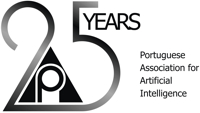AITUM
Artificial Intelligence in Transportation and Urban Mobility
The Thematic Track on Artificial Intelligence in Transportation and Urban Mobility (AITUM'2009) aims to promote an interdisciplinary debate on current developments and advances of AI theories, applications, and methodologies in a rather practical perspective, focusing on transportation and mobility systems. This Thematic Track follows up the first edition of the AIASTS Workshop, held at EPIA 2007, and will act as a unique platform gathering the AI community, transport practitioners, urban planners, the industry, and other social sciences' researchers to discuss how cutting-edge AI technologies can be effectively developed and applied to improve transportation performance and urban mobility towards sustainable systems. This forum is an opportunity to present progresses made so far, and a means to generate new ideas towards building innovative applications of AI technologies into smarter, greener and safer transportation systems, stimulating contributions that emphasise on how theory and practice are effectively coupled to solve real-life problems in contemporary transportation and urban scenarios.
Topics of Interest
The AIT Thematic Track welcomes and encourages contributions reporting on original research, work under development and experiments of different AI techniques, such as neural networks, biologically inspired approaches, evolutionary algorithms, knowledge-based and expert systems, case-based reasoning, fuzzy logics, intelligent agents and multi-agent systems, support vector regression, data mining and other pattern-recognition and optimisation techniques, as well as ambient intelligence and ubiquitous computing, service-oriented architectures, and ontology, to address specific issues in contemporary transportation, which would include (but are not limited to):
- different modes of transport and their interactions (air, road, rail and water transports);
- intelligent and real-time traffic management and control;
- design, operation, time-tabling and management of logistics systems and freight transport;
- transport policy, planning, design and management;
- environmental issues, road pricing, security and safety;
- transport systems operation;
- application and management of new technologies in transport;
- travel demand analysis, prediction and transport marketing;
- traveller information systems and services;
- ubiquitous transport technologies and ambient intelligence;
- pedestrian and crowd simulation and analysis;
- urban planning toward sustainable mobility;
- service oriented architectures for vehicle-to-vehicle and vehicle-to-infrastructure communications;
- assessment and evaluation of intelligent transportation technologies; and,
- artificial transportation systems and simulation.
Organising Committee
- Rosaldo Rossetti, University of Porto, Portugal
- Ronghui Liu, University of Leeds, UK
- Elisabete Arsénio, National Laboratory of Civil Engineering, Portugal
- Jorge Lopes, BRISA S.A., Portugal
Contact
rossetti[at]fe[.]up[.]pt
Program Committee
- Agachai Sumalee, The Hong Kong Polytechnic University, Hong Kong
- Alberto Fernandez, Rey Juan Carlos University, Spain
- Ana Almeida, Polytechnic Institute of Porto, Portugal
- Ana Bazzan, UFRGS, Brazil
- Carlos Lisboa Bento, University of Coimbra, Portugal
- Chris Zegras, MIT, USA
- Constantinos Antoniou, MIT, USA
- Danny Weyns, Katholieke Universiteit Leuven, Belgium
- Eduardo Camponogara, UFSC, Brazil
- Eugénio Oliveira, University of Porto, Portugal
- Fei-Yue Wang, University of Arizona, USA
- Francisco Pereira, University of Coimbra, Portugal
- Franziska Klügl, Örebo University, Sweden
- Geert Wets, University of Hasselt, Belgium
- Giovanna Di Marzo Serugendo, Birkbeck College, University of London, UK
- Giuseppe Vizzari, University of Milan-Bicocca, Italy
- Harry Timmermans, Eindhoven University of Technology, The Netherlands
- Henry Liu, University of Minnesota, USA
- Hussein Dia, Connell Wagner, Australia
- João Bento, Brisa S.A. / IST, Portugal
- José Telhada, University of Minho, Portugal
- Kai Nagel, Technical University of Berlin, Germany
- Luís Nunes, ISCTE, Portugal
- Luís Osório, ISEL, Portugal
- Luís Paulo Reis, University of Porto, Portugal
- Moshe Ben-Akiva, MIT, USA
- Sascha Ossowski, Rey Juan Carlos University, Spain
- Shuming Tang, Chinese Academy of Sciences, China

